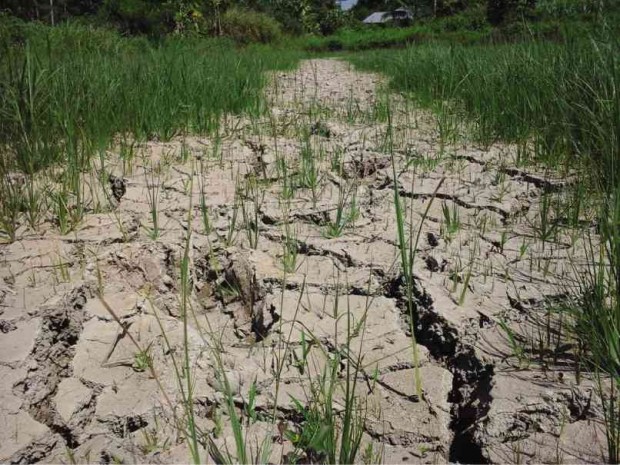Drought turning VisMin farms into parched wasteland

RICE FIELDS in Matalam town, North Cotabato province crack as severely high temperatures, tagged as an effect of El Niño, continue to prevail over the town. WILLIAMOR A. MAGBANUA / INQUIRER MINDANAO
Like flames turning into ash everything in their path, drought is destroying farm after farm in Mindanao and Visayas, changing the color of the islands’ agriculture from green to burnt brown.
In North Cotabato, the drought, a result of an El Niño episode that experts said is more punishing than previous ones, prompted the provincial legislative board on Tuesday to declare a state of calamity in the entire province.
State of calamity
In Negros Occidental, authorities reported crop losses worth P35.1 million, a figure which is expected to further increase as El Niño is far from over.
Igmedio Tabianan, Negros Occidental agriculturist, said more than 1,000 hectares of farms in four Negros Occidental towns—Pontevedra, Hinigaran, Moises Padilla and Hinobaan—are drying up, threatening the livelihood of at least 1,150 farmers.
The state of calamity declaration in North Cotabato came as officials estimated at least 30,000 ha of farms had already been devastated by rodent attacks attributed to El Niño.
To seed or not to seed?
Cynthia Ortega, head of the Provincial Disaster Risk Reduction and Management Office of North Cotabato, said the disastrous effects of the dry spell are now being felt in all of the province’s 17 towns and the city of Cotabato.
Ortega said the severely dry weather condition has wilted almost all types of crops in the province and the situation could get worse as El Niño had been projected to last until April.
Eliseo Mangliwan, North Cotabato agriculturist, said damage from the direct impact of El Niño and the rodent attacks had reached P238 million.
To illustrate how disastrous the current El Niño is, Mangliwan said even coconut trees, which are supposed to be weather-resilient, have taken a hit.
Coconut farmers lost a total of P115.7 million in income since the drought started in the last quarter of 2015, he said.
Quick response fund
Mangliwan said the damage cost is likely to balloon when data from banana plantations come in.
The declaration of a state of calamity, said Mangliwan, would pave the way for the release of at least P4 million from the provincial coffer’s quick response fund, which is equivalent to 5 percent of its budget, to help farmers hit by the drought.
Cloud seeding, said Mangliwan, may now be necessary to replenish the supply of water in irrigation facilities and save crops that are still alive.
‘Not that effective’
But in Negros Occidental, Gov. Alfredo Marañon said he is not inclined to support cloud-seeding operations because they are costly and “not that effective.”
Marañon said his administration is instead realigning funds from not-so-necessary projects to those to fight El Niño.
“We will opt for cloud seeding only if there is no more water to pump,” said Marañon. He said rivers in the province still have water which may be tapped for irrigation.
Rat invasion
Roel Villanueva, of the information division of the North Cotabato agriculture office, said the provincial government is also trying to fight rodent attacks on farms.
Agriculture officials in Central Mindanao had said rats are being driven out of their burrows by the heat resulting from the El Niño phenomenon.
Villanueva confirmed that at least P30 million in crops have been destroyed by rats in three towns, including Kabacan, where a state of calamity had been declared ahead of that for the province.
Community effort
Twenty-one villages in Kabacan had reported rat attacks.
Villanueva said most crops attacked by rats were in their vegetative stage.
Gov. Emmylou Taliño-Mendoza had ordered the distribution of zinc phosphide, a pesticide against rats, to areas hit by the rodent attacks.
Villanueva said farmers were also advised to clean their surroundings to rid communities of rat hideouts.
In the town of M’lang, North Cotabato, Mayor Joselito Piñol said a campaign to get rid of rats is working.
While rat attacks are still being reported in M’lang, Piñol said the damage is not as massive as that in other areas.
“It has to be a community effort,” Piñol said. Williamor Magbanua, Inquirer Mindanao and Carla P. Gomez, Inquirer Visayas














